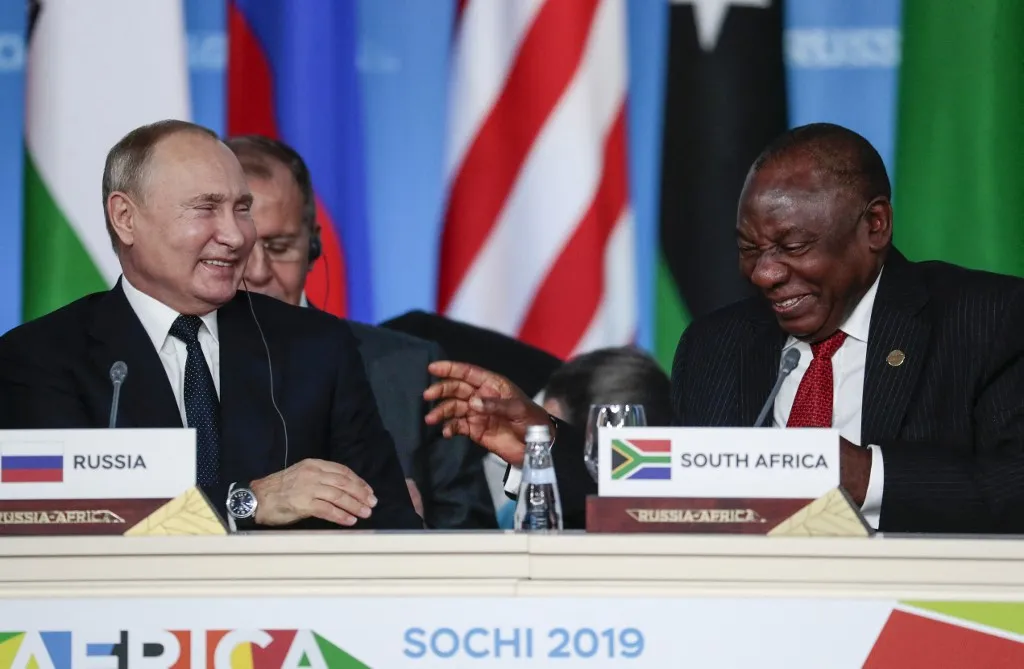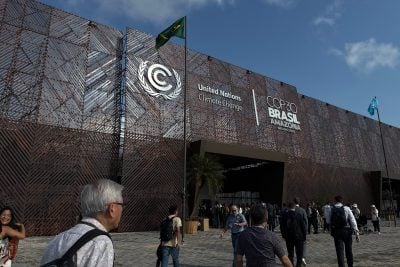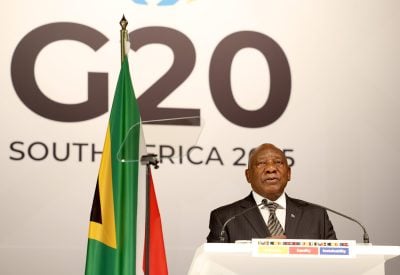In late January, Russian foreign minister Sergey Lavrov visited South Africa, Eswatini, Botswana and Angola in a bid to shore up Moscow’s influence in the region.
While the ongoing war in Ukraine has seen Moscow increasingly isolated internationally, talks with South African foreign minister Naledi Pandor revealed that for South Africa, at least, relations with the regime of president Vladimir Putin are very much business as usual. Pandor said that it would be “simplistic and infantile” to demand that Russia withdraw from Ukraine and confirmed that the “friends” will collaborate on naval exercises alongside China.
However reviled Moscow may be in Europe and the West, it is clear that there continues to be a residual respect for it in many African capitals. In Russia in Africa: Resurgent power or bellicose pretender? Samuel Ramani, a tutor of politics and international relations at the University of Oxford and an associate fellow at the Royal United Services Institute think-tank, gives a detailed analysis of the roots of Russia-Africa relations – from the 16th-century bond between Christian communities in Egypt and Russia, to the Soviet Union’s support for anti-colonial movements in the 20th century.
The bulk of this fascinating book, though, looks at how relations have developed over the past three decades. It describes the tumultuous 1990s after the fall of communism as a “lost decade” for Russia’s influence in Africa.
Ramani studies the resurgence in relations from 2000-08 as Putin consolidated his power; the interregnum under President Dimitry Medvedev; and Russia’s modern quest for diplomatic support, trade and military ties in the wake of the Ukraine conflict.
He offers incisive analysis of Russia’s new power projection tactics in Africa, Russia’s Africa policy in the age of Covid, and the ongoing fallout of the contemporary events in Eastern Europe. There is plenty of ground to cover given his contention that “no book-length study of Russia’s post-Cold War policy towards Africa has been completed”.
Fallout of the Ukraine conflict
Certainly the most topical chapter covers the fallout of Russia’s euphemistically-named “special military operation” that in February 2022 rolled across the Ukraine border in a widely-anticipated bid to occupy its western neighbour. President Putin sought to overthrow Ukraine’s President Volodymyr Zelensky and install a pro-Kremlin president in Kyiv – as part of his vision of reclaiming for Russia the superpower status of the former USSR that disintegrated in 1991.
Africa’s reaction to Russia’s Ukraine invasion has been mixed. South Africa’s President Cyril Ramaphosa dismayed the West by opining that the Ukraine war might have been avoided if NATO had refrained from eastward expansion. In contrast, the presidents of Ghana and Mozambique both condemned the invasion’s impact on global security.
On 21 February 2022, ambassador Martin Kimani, Kenya’s permanent representative to the United Nations, gave a powerful speech at the UN, in which he stated that “the territorial integrity and sovereignty of Ukraine stands breached” and argued that there were “multiple diplomatic tracks available and underway that had the ability to offer peaceful solutions”.
But in general, Ramani argues, “despite Russia’s appalling war crimes in Ukraine and the gravity of Moscow’s violations of international law, the Global South has not mirrored the West’s policies to counter Russian aggression.” In a divisive vote at an emergency meeting of the UN General Assembly on 27 February 2022, 28 African countries (51%) voted to condemn Russia’s invasion, 17 abstained (31%), one voted against and eight were not in the room.
In some cases the equivocal stance stems from lasting gratitude for the Soviet Union’s support for African liberation struggles during the Cold War era. In addition, African countries that suffered under the yoke of European imperialism are reluctant to take lectures from the West on democracy and human rights.
Others value trade ties: trade between Russia and Africa has doubled since 2015 to almost $20bn a year, the African Export-Import Bank reported last year, with Russia exporting $14bn worth of goods and services and importing roughly $5bn of African products in a year.
Military ties that divide
Indeed, as Lavrov’s visit shows, Russia believes there is continued scope for expanded ties – particularly in the military sphere. Ramani has stated that Russia’s military exports to Africa are greater than those of the US, France and China’s combined. The Wagner Group, a state-affiliated mercenary organisation, has actively boosted its influence across the continent and has provided armed support for governments in countries such as the Central African Republic and Mali.
In September 2020 the US imposed sanctions on Wagner, alleging that it was being used to enrich Yevgeny Prigozhin, the group’s founder and close associate of President Putin, through mining interests in Sudan and the Central African Republic.
In January of this year the US State Department designated the Wagner Group a “transnational criminal organisation”. In Ukraine, where Wagner plays an increasingly prominent role on the battlefield, the organisation has been accused of enlisting prisoners with the promise of amnesties while engaging in war crimes.
Ramani says that the increasingly fearful reputation of the group has sparked concern in Africa: “The alleged involvement of Wagner Group… in alleged war crimes in Libya and the Central African Republic; Russia’s support for authoritarian regimes in Africa; and Moscow’s failed Covid-19 vaccine distribution campaign have eroded Russia’s soft power,” he writes.
Limitations of Russian engagement
Perhaps most significantly for Russia’s relations, the war has disrupted the flow of vital agricultural produce from the Black Sea region to Africa, helping to spur food inflation and the cost-of-living crisis across the continent.
While Russia has tried to deflect the blame for the disruption to Western sanctions, many African governments would like to see an immediate end to the conflict and a resumption in trade from the breadbaskets of Eastern Europe. This mixed picture for Russia-Africa relations in the wake of the war adds to significant challenges to Putin’s attempt to solidify ties with sympathetic countries on the continent.
Despite this, Ramani is sanguine about Russia’s future influence in Africa. In a postscript he says that while African foreign policy disagreements with the West will continue to offer a diplomatic lifeline to Moscow, the limitations of engagement narrowly based on Russian militarism are clear.
“The Global South’s growing alienation from US and European foreign policy diktats provides Russia with a durable soft power foundation, and will ensure that Africa does not isolate Moscow, but consignment to virtual great power status remains a virtual certainty. Given these limitations, the story of Russia’s post-Communist policy towards Africa is one of an incremental resurgence that culminates in unfulfilled promises and foiled dreams.”
Want to continue reading? Subscribe today.
You've read all your free articles for this month! Subscribe now to enjoy full access to our content.
Digital Monthly
£8.00 / month
Receive full unlimited access to our articles, opinions, podcasts and more.
Digital Yearly
£70.00 / year
Our best value offer - save £26 and gain access to all of our digital content for an entire year!
 Sign in with Google
Sign in with Google 



